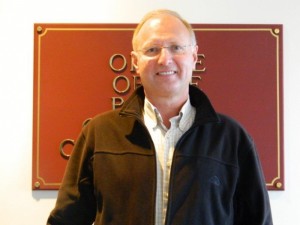Public oversight. What is it, and what does it mean for you?
Okay, hold on: I can see you turning the page already, so just give me two minutes. Trust me, by the end of this article, you’ll be all over public oversight.
In a world where technology moves ahead at a rate faster than you first turning away from this story, it actually means a lot to you. In a world where you’ll soon be an active part of the workforce, it means a whole lot to you. In a world where police and government agencies have a whole lot of control over the public, it means a ton to you.

In a lot of ways, public oversight means a lot to Camosun students, according to Rollie Woods, deputy police complaint commissioner representing the office of the police complaint commissioner, who provide oversight of municipal police. He says that if people come to the event and hear him talk about some specific examples, they won’t think it’s too dull.
“The average person probably doesn’t think much about oversight until they or a member of their family is mistreated by a government office or a person in authority,” he says. “It’s important that every person understands their rights in a democratic society so that they can hold these powerful bodies to account should they not act in the manner that they were created for. I know if I provide some examples of misconduct that I have seen they would not find that boring.”
Oh, right, so back to that first question: what is public oversight? It’s being able to ensure that, for example, in Woods’ case, complaints against police are properly investigated and dealt with appropriately and that the public gets notified that they’re dealt with appropriately.
It’s worth noting that Woods isn’t blind to the fact that people don’t always trust police, or that police, in his words, haven’t always “dealt with misconduct appropriately, and it has resulted in the public losing trust.”
“The Davies Inquiry into the death of Frank Paul and the Braidwood Inquiry into the death of Robert Dziekanski are recent high-profile examples of the police either conducting a poor investigation or attempting to cover up alleged misdeeds,” he says. “With strong independent oversight it has been our experience that the municipal police are responding appropriately, and when they do not, the commissioner has the power under the legislation to deal with those issues and hold them to account.”
Other people speaking alongside Woods provide oversight for other government agencies. Correctional investigator Howard Sapers, BC ombudsperson Kim Carter, and deputy representative for children and youth Jeremy Berland are the other panel members at the event, which is sponsored by the Vancouver Island Criminal Justice Association.

Ombudsperson Carter says that their office exists to ensure that every person in BC is treated fairly in the provision of public services; to promote fairness in public administration; and to make sure that democratic principles such as openness, transparency, and accountability are upheld.
“These are things that matter to students,” says Carter. “The power of the people is an effective motivator for public agencies to act on our recommendations. It’s been our experience that sometimes a complaint from one person results in changes to policy that benefits many people.”
Carter says that as an officer of the legislature, she is actually independent of government and political parties, which helps maintain a degree of fairness and a critical eye towards policies that are not in the public’s best interest.
“We have an ability to shine a spotlight on certain areas that need improvement or where unfairness has occurred, and improve accountability and good governance,” says Carter.
As far as police oversight goes, Woods says that it’s something everyone should be concerned about. Possible abuse of power by arms of the state can be a life-or-death matter.
“Police in particular are given significant powers: power to search, deprive you of your liberty, hold you in custody, seize property, use force They need to be held to a high level of accountability to ensure that those powers are not abused,” he says. “There are many examples where those powers have been abused and it has resulted in wrongful convictions, injuries, and even death of innocent people, so I think it is critical that everyone cares about police oversight.”
Public oversight. That’s what it is, and that’s what it can mean for you. Who knew?
Public oversight: a free public forum
7 pm Monday, December 3
Fisher 100, Lansdowne
bccja.com/vicja.html
